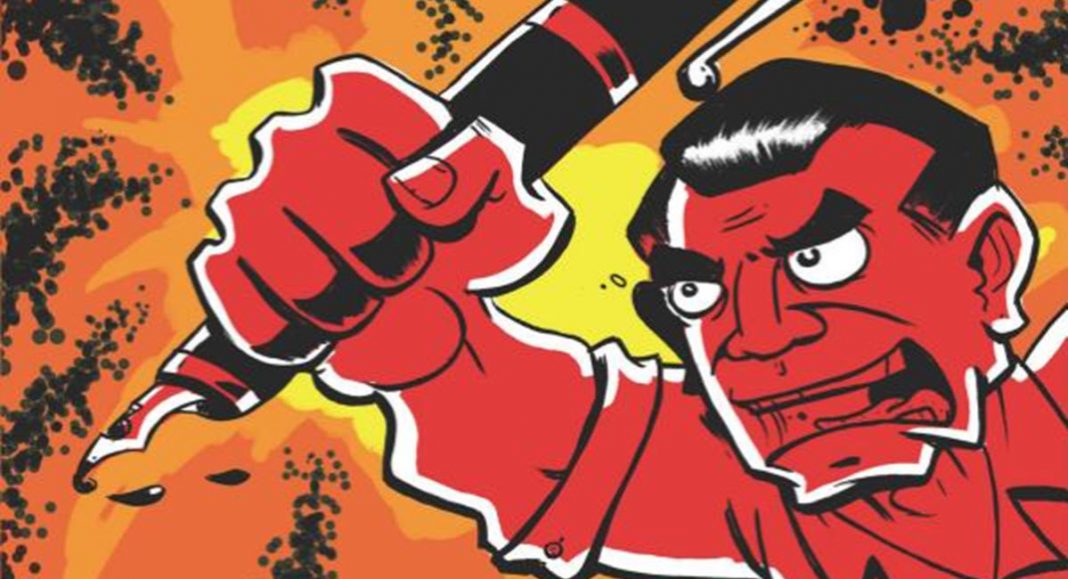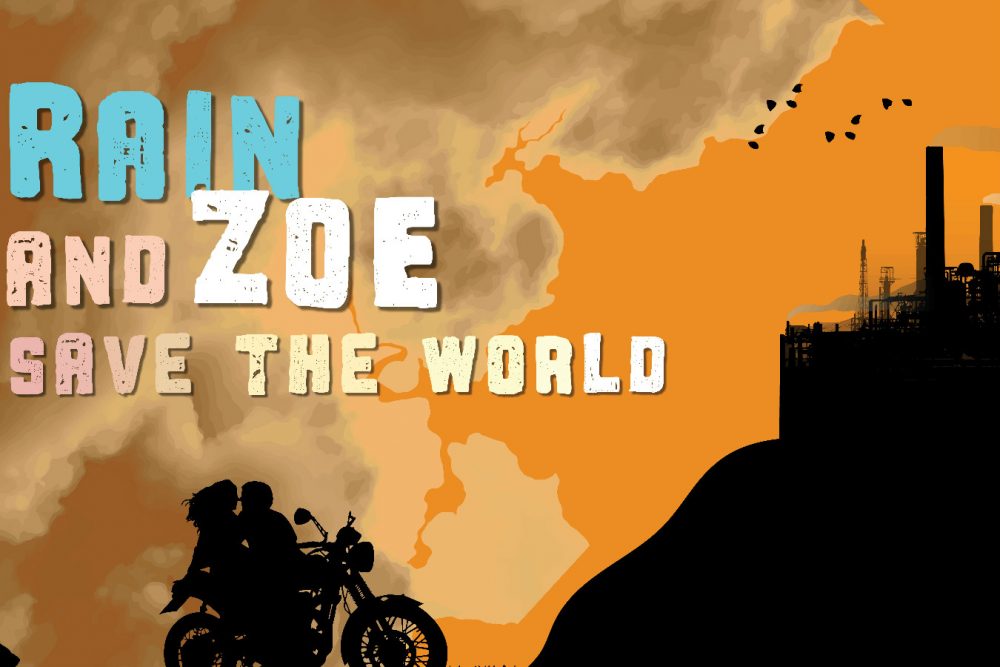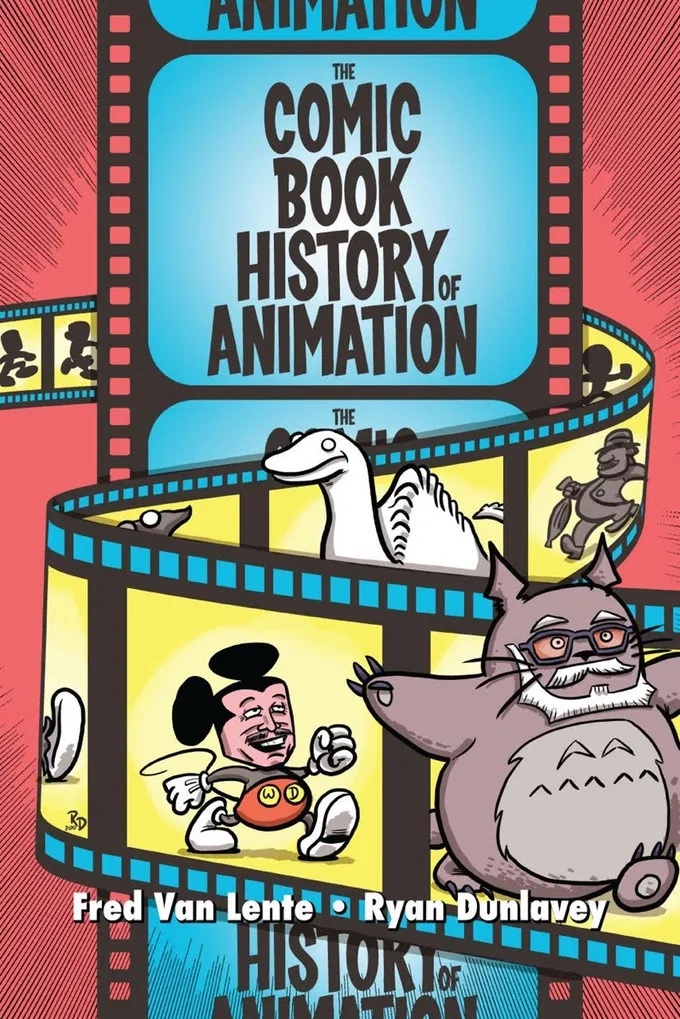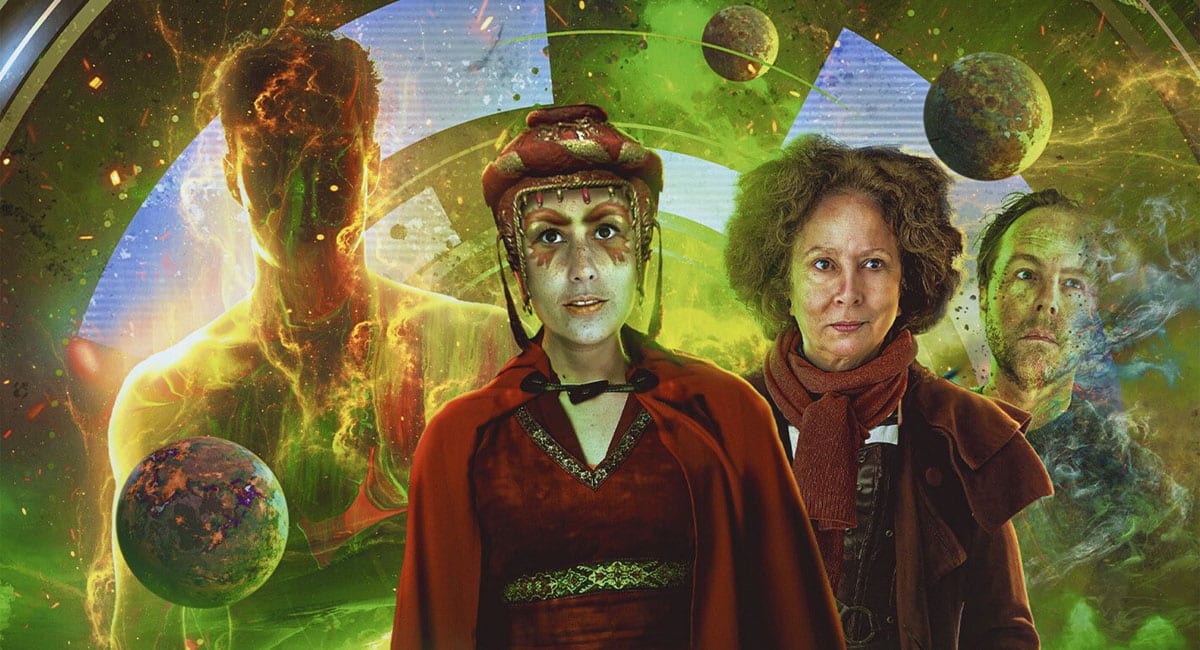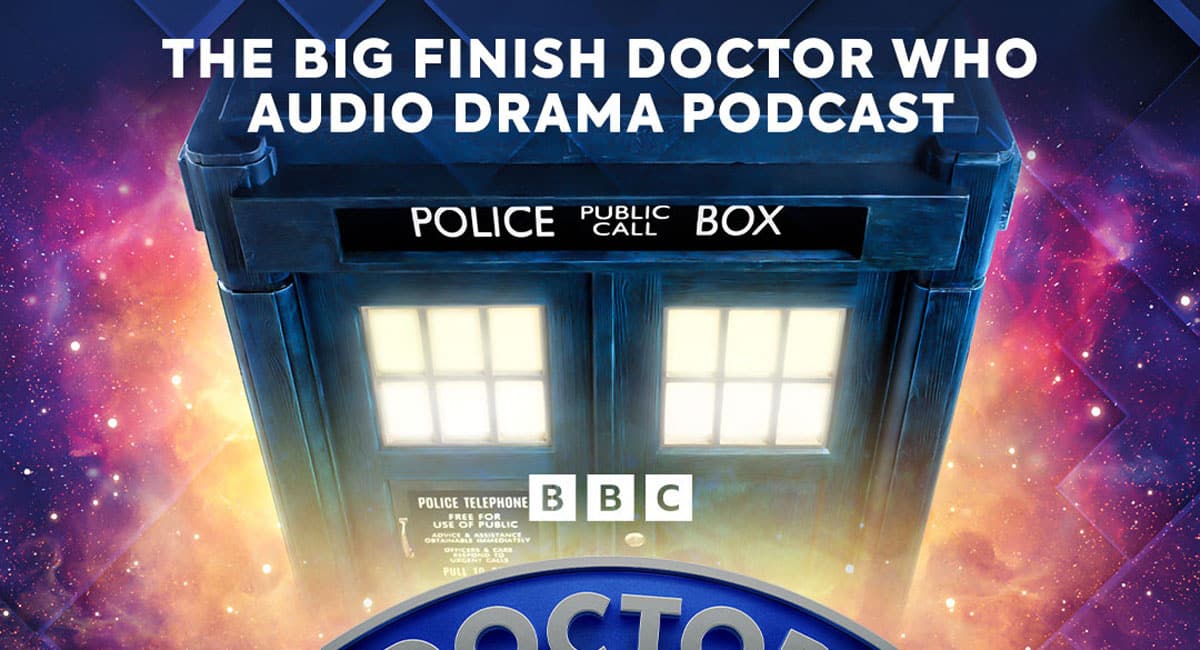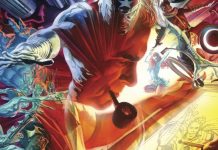Encapsulating the life and times of such a larger than life figure as comic creator Jack “King” Kirby is no easy feat. You can imagine the challenge it presented husband-and-wife writing duo Fred Van Lente and Crystal Skillman when their brought their 75-minute play, King Kirby, to the stage for the first time at the 2014 Comic Book Theater Festival at New York City’s The Brick Theater.
Initially funded as a Kickstarter, King Kirby was a passion project for the couple and the perfect marriage of their respective fields. Van Lente is best known in comic book circles as the writer of such comics as The Incredible Hercules (with co-writer Greg Pak), Action Philosophers, and much more. Skillman meanwhile is a playwright whose work includes original plays like Open, Cut, Rain and Zoe Save the World, and more.
Unless you happened to be in NYC during the original performance chances you haven’t seen the original stage stage production that featured actor Steven Rattazzi in the titular role as well as Amy Lee Pearsall, Joseph Mathers, Timothy McCown Reynolds, and Nat Cassidy respectively as Roz Kirby, Joe Simon, Martin Goodman, and Stan Lee.
However, thanks to the Broadway Podcast Network an audio drama podcast launched last month with original music composed for the drama by Bobby Cronin.
The Beat had the chance to speak with Van Lente and Skillman about translating King Kirby from the stage to the audio medium and why Kirby and his work still resonate today.
TAIMUR DAR: Seems the obligatory first question for interviews in this year is to ask how you two have been holding up during the pandemic?
FRED VAN LENTE: As best as can be. Pretty well for the most part.
CRYTAL SKILLMAN: A lot of creation. The trickier thing is how and when to share. In this case it’s very helpful with the audio drama. Certainly with the theater stuff doing a lot of heavy lifting to get everything in shape for production in 2022.
DAR: Obviously the theater industry is on hold due to the pandemic so did the idea of bringing the audio drama of the King Kirby to the Broadway Podcast Network something that came about in the past year because of the pandemic or was it already in the works long before quarantine?
VAN LENTE: The audio, believe it or not, of the current production was taped with the original New York cast back in 2014. We recorded it at Midtown Comics Downtown on Fulton Street. We wanted to give our Kickstarter backers from all over the world an opportunity to experience the show in some way. Because of various union rules we weren’t allowed to film the show so we recorded an audio version, essentially a reading. Midtown Comics posted that reading on their podcast but since then that version kind of disappeared into iTunes.
Over the summer someone did approach us being like, “Hey, have you ever thought about doing this as an audio drama?” We remembered we had the original cast doing the show. That’s where Bobby [Cronin] came in.
SKILLMAN: Yes, Bobby Cronin are working on a few musicals and plays with music together.
I instantly thought of him when we had this opportunity because we wanted to attract the serialized excitement of audio drama but also make it very clear that with the Avengers movies and superheroes coming out of pop culture this was a modern piece. We wanted to score to sound modern even though the events span Kirby’s life which started in the ‘30s and the ‘40s.
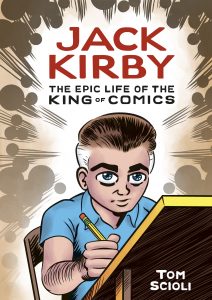
VAN LENTE: I think part of it was he almost had his Forrest Gump-esque existence where he touched in on all these important moments of the 20th century. He started in slums of Manhattan during the Great Depression. He fought in France. He came up with these iconographic romance comics of the ‘50s. Now everybody knows Marvel thanks to the Avengers series of films. I think it was a lot easier than we were anticipating because the themes are universal and this idea of an artist struggling to get his due is a universal story even if you don’t know all the ins and outs and “controversy” around Stan Lee and the authorship of Marvel Comics.
To a certain extent it’s easier to explain the latter half of the show when Marvel held his art hostage which was an extremely dumb move on their part from a public relations standpoint. And it’s a simple MacGuffin people can wrap their brains around. You don’t need to be an expert on the 1976 Copyright Act to get that conflict.
SKILLMAN: And the fact that so much of it was public and loved and yet he was publicly being cheated. We have it in the play, Roz his wife remarks, “I see you everywhere. I see you on t-shirts and lunchboxes. I see your artwork but where are you?” When someone creates something and then they’re divorced from that, it really taps into the struggles of American work life as well.
DAR: Over the summer I read cartoonist Jonathan Callahan’s memoir Don’t Worry, He Won’t Get Far on Foot and the 2018 adaptation directed by Gus Van Sant. It definitely takes a lot of liberties with Callahan’s actual life in order to bring his story to film. For you then, how was it maintaining the balance of being true to Kirby’s life while also creating a cohesive play?
VAN LENTE: The play was created for a theater festival. For those who do not know what that entails, that means there are dozens of shows in a single theater. You have to be a ninja operation and you have to be ready to load in when the show before you ends. And you’ve got to get the hell out as soon as your show ends. We were contractually obligated to deliver a 75-minute script. If anything what I regret is not being able to include more instances from Kirby’s life.
It also would have been fun to talk about, you brought it up earlier, him going to Ruby-Spears the animation studio and experiencing that kind of love. We didn’t change anything that I can really think of off the top of my head but there were sins of omission that were unfortunately necessary because we had this time limit.
SKILLMAN: I always teach my playwrighting students this and it’s something I feel passionately about. Even though this does tell the story of his life, this is a really beautiful play regardless of the fact that it’s following someone’s life. The play’s mission isn’t to teach you about Jack Kirby, it’s to experience his life and times. What that means in a theatrical experience needs to be interpreted. There’s a difference between it being a book and saying, “I want you experience it in this space and time in the 75-minutes we’re allotted.”
VAN LENTE: The podcast fortunately is longer!
[Laughter]
SKILLMAN: It also gives you a little bit of breath and space and time because we’re doing it each week. It’s really interesting episodically. There are some great cliffhangers. We’re getting all these messages at the end of each episode, “Oh my gosh! I can’t wait for what happens next.” Comic book fans as you know are excited to see how it’s dramatized. I think the opening of the piece which is kept here in the audio version, hearing Jack creating after he’s gone and questioning the number of which his work is being auctioned at. He doesn’t really have a relation to that high number. He cuts off the auctioneer before he hears and he goes into his life story. That accomplishes a lot. It frames the play as a man investigating his worth, his time, and work. What does the story all add up to? The play be it audio or theatrical form is within that context. They can pick up a book for extra details like dates and times and places. We definitely have a lot already. This is our style. We like it to feel like a comic book. We like it to feel action-packed in that sense. Some people are used to theater having a more space and breath. But breaking it into four episodes gave you time to contemplate and get revved up again. This form has enhanced the storytelling.
DAR: The marriage between Kirby and his wife is a major aspect of King Kirby. That seems to be a fitting reflection not only for you working together on this as a married couple but the marriage of your primary respective mediums i.e. Fred in comics and Crystal in theater. I’m particularly curious for Fred, was writing dialogue to be spoken by actors or challenge and did you rely on Crystal for that of the writing process?
VAN LENTE: I definitely had Crystal around to keep me honest and that was great. I was a film major and I did plays and sketches. We actually did a reading of a version of this play when originally written a decade ago. I certainly have plenty of experience writing dialogue for actors. And I’ve written video games.
SKILLMAN: A little trick that I like that you do in comics that we applied in Eater Fighter and Adventure Time, my first comics I wrote on the flipside, was write the dialogue first. Fred has always been a dialogue junky but writes the dialogue first. I have a scripted audio series and something I’m adhering to as well. Especially in audio because of the sound and dialogue and theater is made for that medium.
What I saw Fred enjoy in the live form was all the interpretations that could happen. That’s where I really enjoyed seeing Fred hear his dialogue in a number of ways. And also rehearsed and directed in a number of ways within rehearsal. That was really fun for me having done it for so long. When you collaborate with someone who has that skill but hasn’t been in the theater room that much, but now Fred has, it made me love my craft again. When you see someone else excelling at it and getting excited, it reinvigorates you as to why you love it.
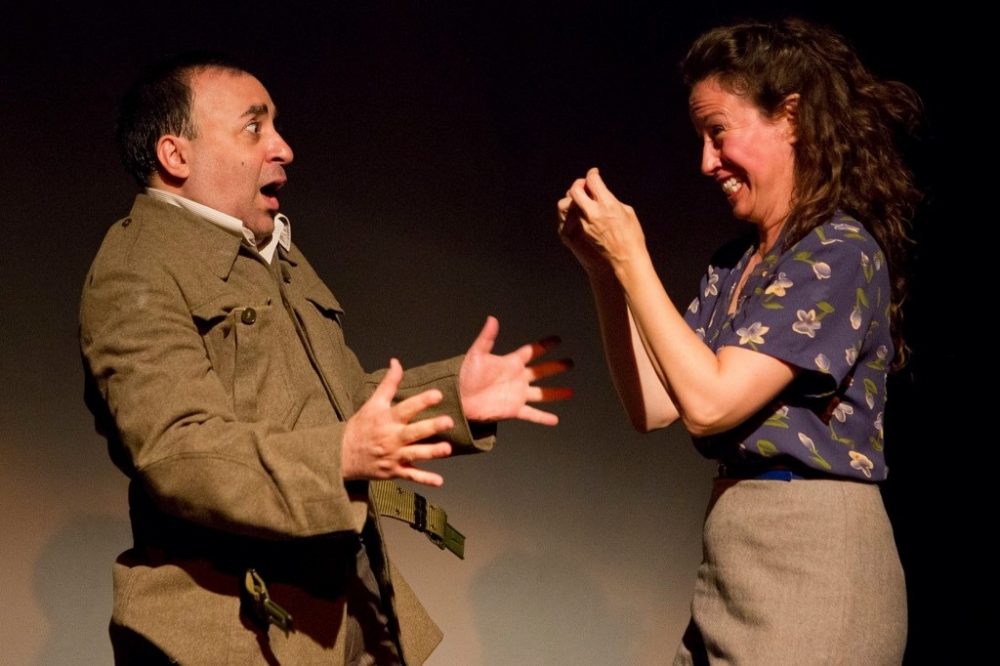
DAR: When you produce a person’s life you always want to do your due diligence lest you end up upsetting the person’s family like we saw with the reactions from Don Shirley’s family the film Green Book. I’m curious if the Kirby family and estate ever contacted you about the play.
VAN LENTE: When we got a really nice review in the New York Times, Kirby’s son reached out and wrote me a very nice note which I really appreciated which was quite gratifying.
SKILLMAN: I like the idea when you’re beginning something you’re trying to investigate what it is. You don’t wanted to be influenced yet by interviews with the actual family members or that sort of thing. I thought that was a very good approach. Rand Hoppe was really helpful at the Kirby Museum. Even though I didn’t meet Roz, I got a sense of her quality, warmth, generosity, tenacity. I read an interview that said she had inked one of the comics. Those were all things based on interviews or something she said. Anything with the children, I wanted to make sure to respect that this is a story about an artist and this journey but also the privacy of this family. So there isn’t much about the family other than Roz and Jack’s working relationship.
DAR: Is it safe to assume your research resources for King Kirby were basically the same ones that Scioli mentions in his Jack Kirby graphic novel?
VAN LENTE: Yeah. Prior to this version of the play in 2014, Ryan Dunlavey and I had done the Comic Book History of Comics so I had done the research for that book. A lot of Jack Kirby Collector and Comics Journals. He was probably one the most interviewed human beings on the planet. There’s a lot of video of him. There was a lot to draw from. In some cases, 90% of George Patton’s dialogue comes directly from Patton’s letters. There’s an incident where he screams at his men for not being killed like they were supposed be in his battle plan. That’s a story that Kirby told that was in the Jack Kirby Quarterly, the British Kirby magazine.
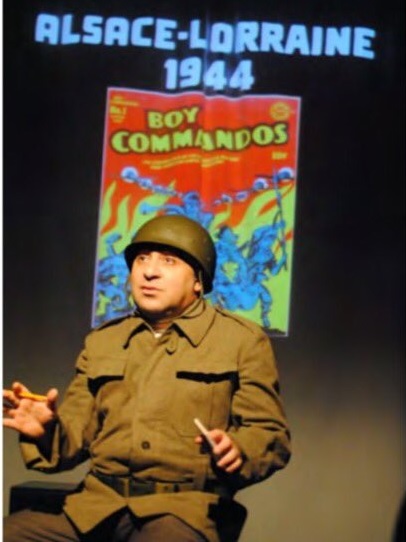
DAR: What future plans do you have for King Kirby?
SKILLMAN: One of the beautiful things about the journey of this finding its way into Broadway Podcast Network was meeting Dori Berinstein and Alan [Seales] and they gushed about how much they loved the play. It meant a lot to us because we only had that 8-week run downtown. It was kind of this cult hit. I didn’t even know the New York Times was coming. The play had about five productions around the world but I’m hoping it will reinvigorate productions of the play. It’s a play I always thought it would do well on Broadway and I just think it would fascinate an audience. It does everything that you’re looking for. You’ve got Marvel fans that are captivated by hearing it. And then you’ve got people exploring and discovering where their pop culture come from and being reinvigorated by that. It’s quite a good combo.
VAN LENTE: A small world thing also, Dori told us at our initial meeting that she used to have offices down the hall from Steve Ditko of all people, the famously reclusive Doctor Strange and Spider-Man creator. She would bump into him in the hallway and chat with him in the elevator, so she already an affinity for this kind of material from her own life.
DAR: Finally, what other upcoming projects do you both have?
SKILLMAN: I’ve got a scripted audio drama series I’m working on from BOOM Integrated called The Magician’s Magician coming off from a play called OPEN which is also available from Dramatists Play Service. That series should be available in the summer. My plays Rain and Zoe Save the World and Mary and Max have been optioned by DDM Productions and so we’re discussing where that goes next week. It looks like Rain and Zoe will be produced in the UK in 2022.
VAN LENTE: The aforementioned Ryan Dunlavey and I are currently doing the Comic Book History of Animation which is coming out in comics form through IDW. I’m also doing the Dynamite zombie crossover DIE!namite, which we’re having tons of fun doing.
King Kirby is available now on the Broadway Podcast Network.


